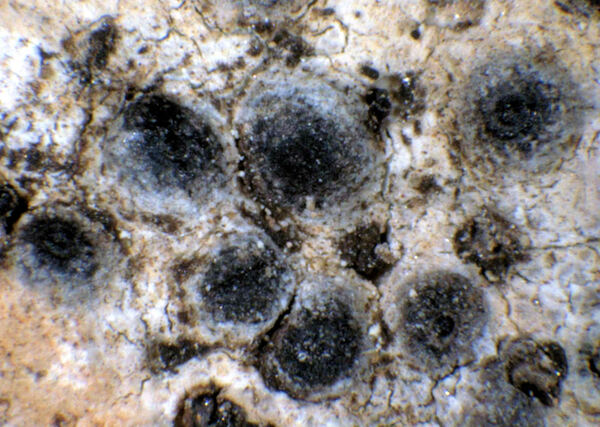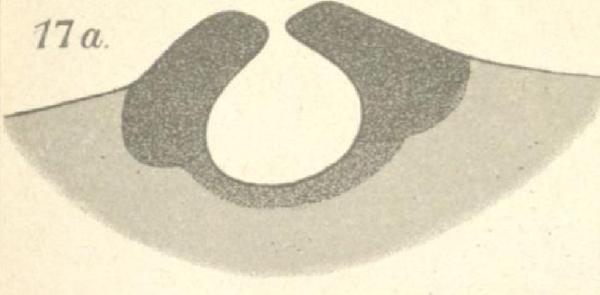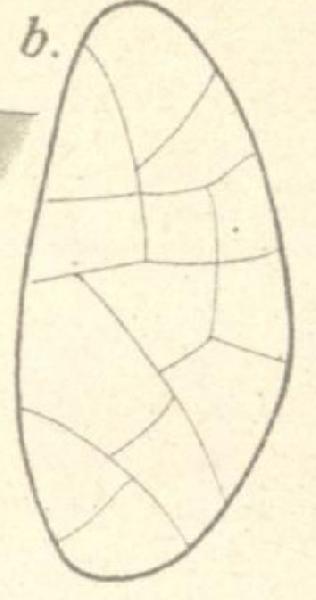Polyblastia cupularis A. Massal. f. cupularis
Ric. Auton. Lich. Crost.: 148, 1852.
Synonyms: Polyblastia flavicans Müll. Arg.; Polyblastia intercedens (Nyl.) Lönnr. non sensu Th. Fr.; Polyblastia lutosa Zschacke; Polyblastia pallescens Anzi; Thelotrema acrocordiaeforme Anzi
Description: Thallus crustose, endosubstratic to thinly episubstratic, whitish to pale grey, sometimes with a brownish tinge, continuous to cracked, rarely with marginal black lines (f. crepaturae Zschacke). Perithecia black, basally immersed in the thallus, forming moderately prominent, 0.4-0.7 mm wide projections, not covered by thallus, with a slightly depressed apex and a finally widely gaping ostiole. Involucrellum well-developed, clasping exciple and slightly spreading in lower part; exciple dark throughout or at least in upper half; hamathecium of periphyses and periphysoids, interascal filaments absent. Asci 8-spored, clavate, K/I-, fissitunicate, the wall thickened above, with an ocular chamber, dehiscent by extrusion of an endotunica to form a delicate rostrum. Ascospores muriform, hyaline, ellipsoid to broadly ellipsoid, (22-)25-45(-55) x (14-)17-25(-30) μm. Photobiont chlorococcoid. Spot tests: K-, C-, KC-, P-, UV-. Chemistry: without lichen substances.
Growth form: Crustose endolithic
Substrata: rocks
Photobiont: green algae other than Trentepohlia
Reproductive strategy: mainly sexual
Commonnes-rarity: (info)
Alpine belt: rather common
Subalpine belt: rather rare
Montane belt: rare
Dry submediterranean belt: absent
Humid submediterranean belt: absent
Padanian area: absent
pH of the substrata:
1 2 3 4 5
Solar irradiation:
1 2 3 4 5
Aridity:
1 2 3 4 5
Eutrophication:
1 2 3 4 5
Poleotolerance:
0 1 2 3
Altitudinal distribution:
1 2 3 4 5 6
Rarity
absent
extremely rare
very rare
rare
rather rare
rather common
common
very common
extremely common
Loading data...
Occurrence data
Predictive map
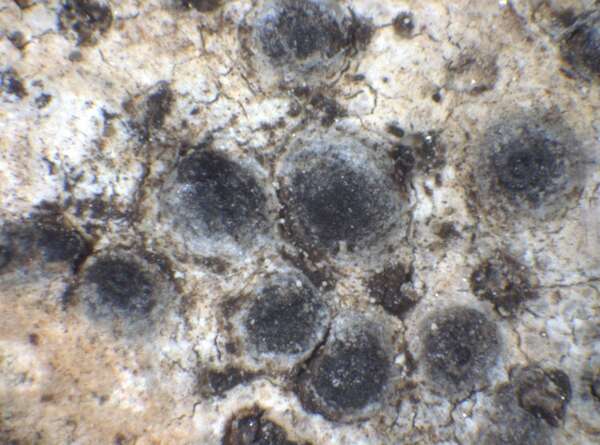
P.L. Nimis; Owner: Department of Life Sciences, University of Trieste
Herbarium: TSB (6471)
2003/03/12
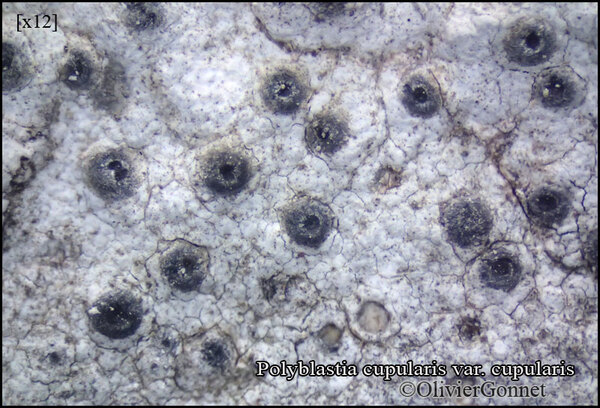
Courtesy Danièle et Olivier Gonnet - Source: https://www.afl-lichenologie.fr/Photos_AFL/Photos_AFL_P/Text_P_3/Polyblastia_cupularis_cupu.htm
France, session AFL 2015 dans le Lot
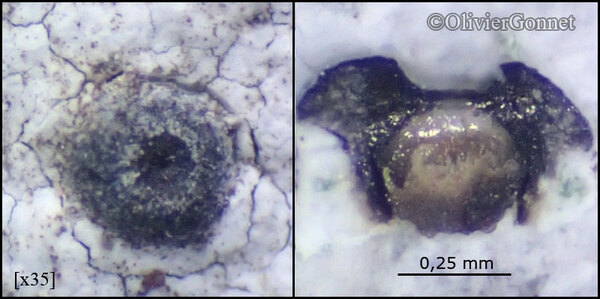
Courtesy Danièle et Olivier Gonnet - Source: https://www.afl-lichenologie.fr/Photos_AFL/Photos_AFL_P/Text_P_3/Polyblastia_cupularis_cupu.htm
France, session AFL 2015 dans le Lot
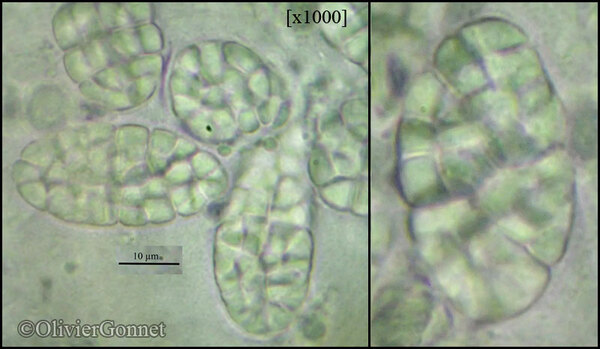
Courtesy Danièle et Olivier Gonnet - Source: https://www.afl-lichenologie.fr/Photos_AFL/Photos_AFL_P/Text_P_3/Polyblastia_cupularis_cupu.htm
France, session AFL 2015 dans le Lot
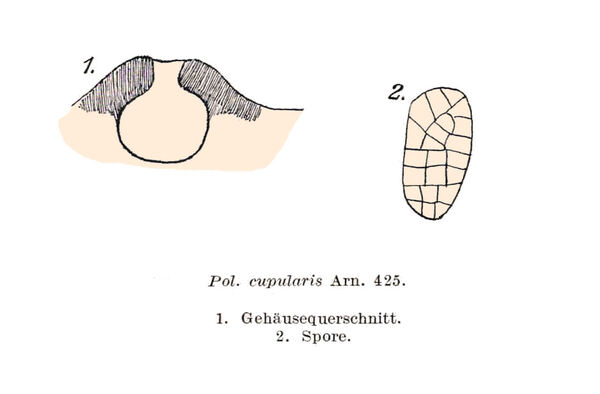
Zschacke, H. (1934) Epigloeaceae, Verrucariaceae und Dermatocarpaceae. In: Dr. L. Rabenhorst‘s Kryptogamen-Flora, Band 9, Abt. 1, Teil 1. Akademische Verlagsgesellschaft, Leipzig, 695 pp. - Public Domain
TSB 6471
Growth form: Crustose endolithic
Substrata: rocks
Photobiont: green algae other than Trentepohlia
Reproductive strategy: mainly sexual
Commonnes-rarity: (info)
Alpine belt: rather common
Subalpine belt: rather rare
Montane belt: rare
Dry submediterranean belt: absent
Humid submediterranean belt: absent
Padanian area: absent
pH of the substrata:
| 1 | 2 | 3 | 4 | 5 |
Solar irradiation:
| 1 | 2 | 3 | 4 | 5 |
Aridity:
| 1 | 2 | 3 | 4 | 5 |
Eutrophication:
| 1 | 2 | 3 | 4 | 5 |
Poleotolerance:
| 0 | 1 | 2 | 3 |
Altitudinal distribution:
| 1 | 2 | 3 | 4 | 5 | 6 |
Rarity
absent
extremely rare
very rare
rare
rather rare
rather common
common
very common
extremely common
Loading data...
Occurrence data
Predictive map

P.L. Nimis; Owner: Department of Life Sciences, University of Trieste
Herbarium: TSB (6471)
2003/03/12

Courtesy Danièle et Olivier Gonnet - Source: https://www.afl-lichenologie.fr/Photos_AFL/Photos_AFL_P/Text_P_3/Polyblastia_cupularis_cupu.htm
France, session AFL 2015 dans le Lot

Courtesy Danièle et Olivier Gonnet - Source: https://www.afl-lichenologie.fr/Photos_AFL/Photos_AFL_P/Text_P_3/Polyblastia_cupularis_cupu.htm
France, session AFL 2015 dans le Lot

Courtesy Danièle et Olivier Gonnet - Source: https://www.afl-lichenologie.fr/Photos_AFL/Photos_AFL_P/Text_P_3/Polyblastia_cupularis_cupu.htm
France, session AFL 2015 dans le Lot



